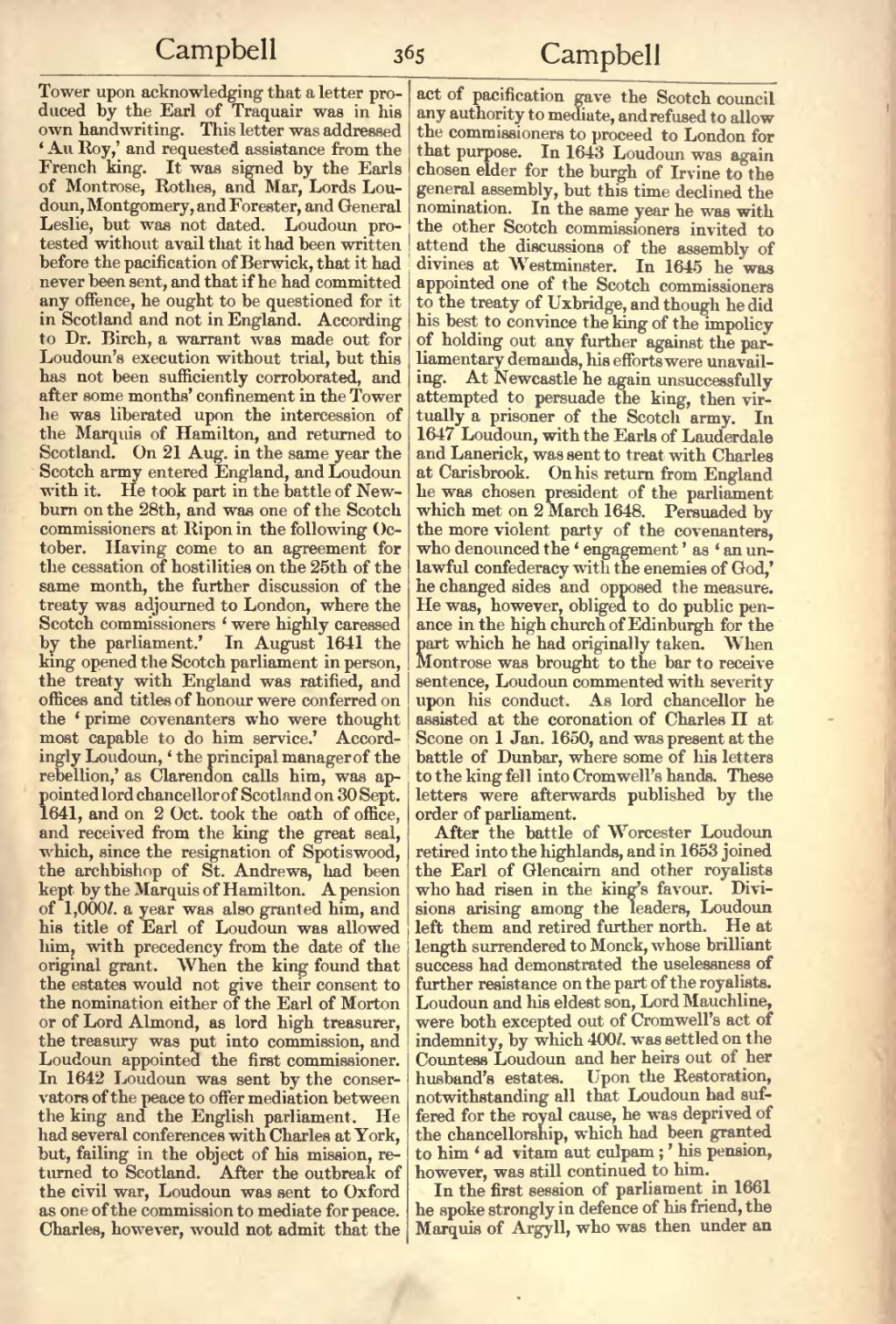Tower upon acknowledging that a letter produced by the Earl of Traquair was in his own handwriting. This letter was addressed ‘Au Roy,’ and requested assistance from the French king. It was signed by the Earls of Montrose, Rothes, and Mar, Lords Loudoun, Montgomery, and Forester, and General Leslie, but was not dated. Loudoun protested without avail that it had been written before the pacification of Berwick, that it had never been sent, and that if he had committed any offence, he ought to be questioned for it in Scotland and not in England. According to Dr. Birch, a warrant was made out for Loudoun's execution without trial, but this has not been sufficiently corroborated, and after some months' confinement in the Tower he was liberated upon the intercession of the Marquis of Hamilton, and returned to Scotland. On 21 Aug. in the same year the Scotch army entered England, and Loudoun with it. He took part in the battle of Newburn on the 28th, and was one of the Scotch commissioners at Ripon in the following October. Having come to an agreement for the cessation of hostilities on the 25th of the same month, the further discussion of the treaty was adjourned to London, where the Scotch commissioners ‘were highly caressed by the parliament.’ In August 1641 the king opened the Scotch parliament in person, the treaty with England was ratified, and offices and titles of honour were conferred on the ‘prime covenanters who were thought most capable to do him service.’ Accordingly Loudoun, ‘the principal manager of the rebellion,’ as Clarendon calls him, was appointed lord chancellor of Scotland on 30 Sept. 1641, and on 2 Oct. took the oath of office, and received from the king the great seal, which, since the resignation of Spotiswood, the archbishop of St. Andrews, had been kept by the Marquis of Hamilton. A pension of 1,000l. a year was also granted him, and his title of Earl of Loudoun was allowed him, with precedency from the date of the original grant. When the king found that the estates would not give their consent to the nomination either of the Earl of Morton or of Lord Almond, as lord high treasurer, the treasury was put into commission, and Loudoun appointed the first commissioner. In 1642 Loudoun was sent by the conservators of the peace to offer mediation between the king and the English parliament. He had several conferences with Charles at York, but, failing in the object of his mission, returned to Scotland. After the outbreak of the civil war, Loudoun was sent to Oxford as one of the commission to mediate for peace. Charles, however, would not admit that the act of pacification gave the Scotch council any authority to mediate, and refused to allow the commissioners to proceed to London for that purpose. In 1643 Loudoun was again chosen elder for the burgh of Irvine to the general assembly, but this time declined the nomination. In the same year he was with the other Scotch commissioners invited to attend the discussions of the assembly of divines at Westminster. In 1645 he was appointed one of the Scotch commissioners to the treaty of Uxbridge, and though he did his best to convince the king of the impolicy of holding out any further against the parliamentary demands, his efforts were unavailing. At Newcastle he again unsuccessfully attempted to persuade the king, then virtually a prisoner of the Scotch army. In 1647 Loudoun, with the Earls of Lauderdale and Lanerick, was sent to treat with Charles at Carisbrook. On his return from England he was chosen president of the parliament which met on 2 March 1648. Persuaded by the more violent party of the covenanters, who denounced the ‘engagement’ as ‘an unlawful confederacy with the enemies of God,’ he changed sides and opposed the measure. He was, however, obliged to do public penance in the high church of Edinburgh for the part which he had originally taken. When Montrose was brought to the bar to receive sentence, Loudoun commented with severity upon his conduct. As lord chancellor he assisted at the coronation of Charles II at Scone on 1 Jan. 1650, and was present at the battle of Dunbar, where some of his letters to the king fell into Cromwell's hands. These letters were afterwards published by the order of parliament.
After the battle of Worcester Loudoun retired into the highlands, and in 1653 joined the Earl of Glencairn and other royalists who had risen in the king's favour. Divisions arising among the leaders, Loudoun left them and retired further north. He at length surrendered to Monck, whose brilliant success had demonstrated the uselessness of further resistance on the part of the royalists. Loudoun and his eldest son, Lord Mauchline, were both excepted out of Cromwell's act of indemnity, by which 400l. was settled on the Countess Loudoun and her heirs out of her husband's estates. Upon the Restoration, notwithstanding all that Loudoun had suffered for the royal cause, he was deprived of the chancellorship, which had been granted to him ‘ad vitam aut culpam;’ his pension, however, was still continued to him.
In the first session of parliament in 1661 he spoke strongly in defence of his friend, the Marquis of Argyll, who was then under an
